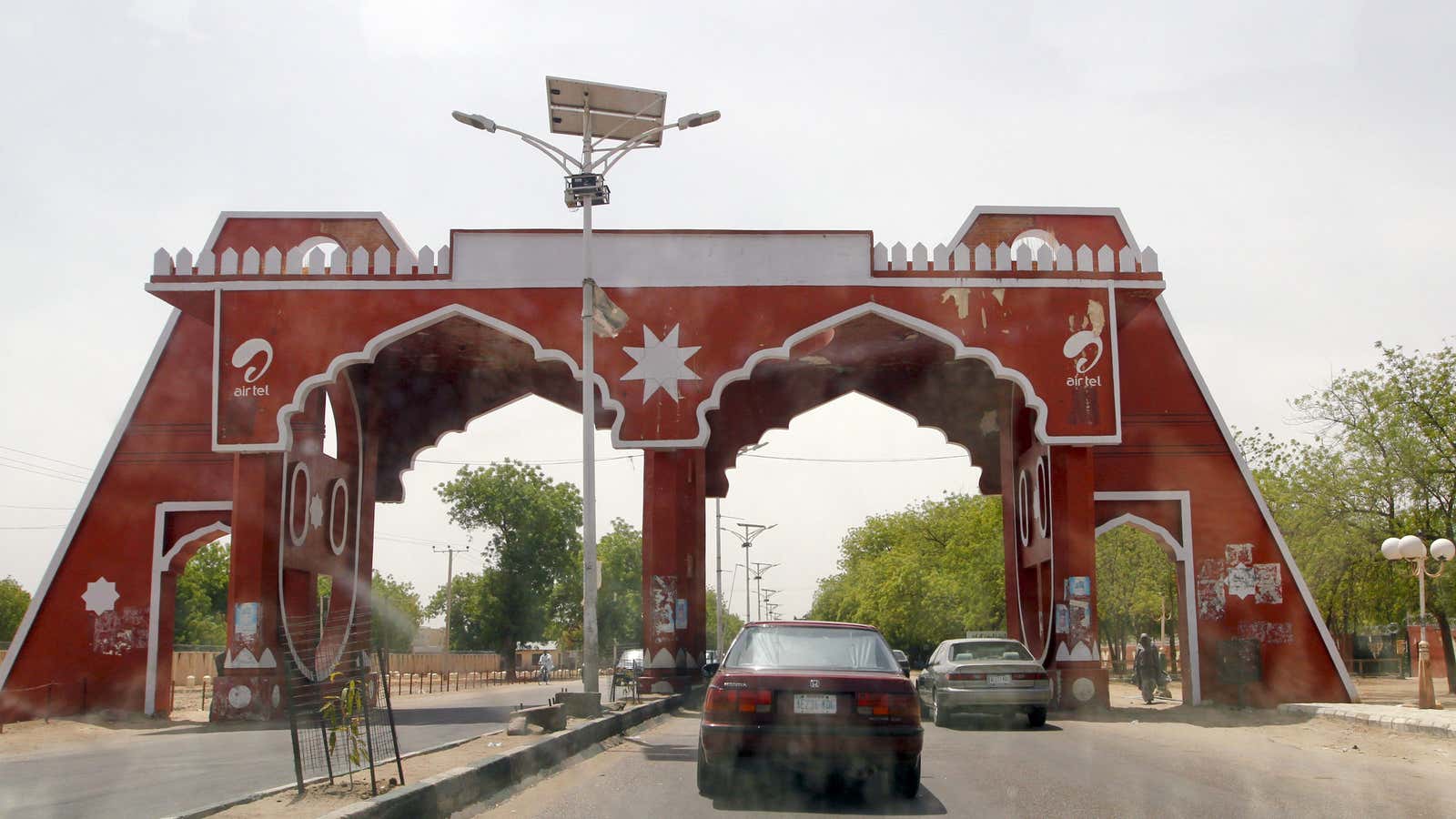Maiduguri, Nigeria
Boko Haram, the Islamic militant group that has terrorized Nigeria’s northeast region since 2009, had killed scores of people and displaced thousands, before they really came into the global consciousness. That was when on the night of April 14, 2014, the insurgent group raided a local high school and kidnapped 276 schoolgirls studying for their exams.
They had attacked the school because it stood for much of what the group professes to hate. In this case, education and female independence. Boko Haram, is coined from a corruption of the English word, book while haram is an Arabic word which means forbidden. So the group’s regressive outlook on what they see as ‘Western’ education has always been clear. The group went on to attack many other schools killing or kidnapping scores of young people. Many educational institutions shut for fear of these deadly attacks.
This is why it’s remarkable that even during the peak of Boko Haram’s insurgency attacks, Nigeria’s major higher institution of learning in the northeastern part of the country—the University of Maiduguri—never closed its doors. More surprising is the fact that the university continued to operate almost in a business as usual fashion. Maiduguri, which is the biggest city in Nigeria’s northeast, is the capital of Borno state. Home to two million people at its peak, it is best known these days as the place where Boko Haram was established.
There has never been an incident of violent extremism on the campus, according to the university authorities and officials of the Civilian Joint Task Force, Borno Command. Habu Kale Tijjani, a local and state coordinator of Borno Social Media Frontiers confirmed the claim, saying the university has been running unperturbed.
But it’s not for want of trying by the terrorist group. University students, particularly young men, are prime candidates for many terrorist organizations around the world, and Boko Haram is no different. They are favored for being both intelligent and impressionable enough to carry out complicated commands in the name of a cause, no matter how vague or flawed.
One student said Boko Haram tried to attack the campus several times but failed in its attempts. The student, who asked not to be identified because he doesn’t have clearance to discuss security matters with the press, noted that intelligence agents were spread across the campus like a spider web and their efforts, alongside those of the university campus guards and the military thwarted Boko Haram’s takeover of the campus. “There was heavy artillery power in the surroundings of the campus,” the source said.

However, they succeeded partially in infiltrating the ranks of students, Habu Kale Tijjani, a civil society activist disclosed. Having failed to take over the campus, Kale noted Boko Haram turned to targeting students off-campus to brainwash them. “Some UNIMAID students followed and converted to the Boko Haram sect. Many even destroyed their university documents,” Kale explained, but noted they were unable or unwilling to carry out any Boko Haram activities on on campus.
The University of Maiduguri, which prides self as the “Centre of Excellence,” was created by the Federal Government of Nigeria in 1975 and is located in the heart of Maiduguri; the historic center of learning in the ancient Kanem-Borno Empire.
The violent Islamic extremists caused Maiduguri a “home of peace” to become the “home of pieces”, in the words of Prof. Aliyu Shugaba, the university’s deputy vice chancellor in charge of academic services, But the university never shut its doors. “We continued with the university’s mission of teaching, research and community service,” he says.
Shugaba noted that university authorities, worried by the increasing rate of suicide bombings, killings and kidnappings across the city of Maiduguri and neighbouring states, had thought of shutting down the university but realized it was no better option.
“Where were our students going to go to?” he asked rhetorically, indicating that neighboring towns to Maiduguri had already been fully captured by Boko Haram. He said they decided to stay on campus because they didn’t want a situation where they will shut down the university and students will be left with no option than returning home, to places where Boko Haram militants were already in charge. This was to avoid a situation where the returning students will either be forcefully conscripted into the insurgent group and turned into killers or killed should they oppose the Boko Haram ideology.
Going by Shugaba, the strategy to keep students on campus has been successful, though most foreign students from Cameroon, Chad, Central African Republic, Niger and Mali returned home, slightly reducing the university’s over 25, 000 student population.
A student, who identified himself only as Yusuf, lived through the peak of the insurgency on campus. “When the Boko Haram insurgency entered a frightening level in 2011, my parents called me to come home. My mind crowded with uncertainty, I rushed home in Borno south.” But Yusuf got home only to find himself closer to danger than he’d ever been on campus. He had to scale a wall through the backyard of his home in the village to avoid having his throat slit the by his childhood friends. He escaped and headed straight back to the university. Yusuf considers the campus to be a safe haven in the ongoing insurgency.
Like Yusuf, Victor Hourso, student leader of the Cameroonian community, said the university campus was the safest place to be during the climax of the Boko Haram reign of terror. “We lived at the mercy of God,” Hourso explained, describing the situation as ‘having gone to hell and back’. He credited the Nigerian Army and other security agencies for their safely during and after the turbulent days.
In the midst of the insurgency, University of Maiduguri has continued to implant itself as a major higher-education institution in the country, especially in the fields of medicine, agriculture, pharmacy, dentistry, engineering and social science. The country’s chief of army staff, Lt-Gen. Tukur Yusuf Buratai is amongst the university’s alumni.
A study conducted in 2014 by the US-based Council on Foreign Relations, which tracked the security situation in Nigeria weekly for over five years, indicates Borno state was the most insecure of all thirty-six states.
Boko Haram has carried out spades of attacks in Nigeria and neighboring Cameroon, Chad and Niger as the group attempted to create an Islamic caliphate around the Lake Chad region.
The terrorist attacks have dropped notably ever since the Nigerian Army moved its anti-Boko Haram command center to Maiduguri 18 months ago. Most schools have reopened and roads to other areas from Maiduguri are now passable. A 6pm curfew has been extended to 9pm for tricycles and 10pm for vehicles.
Dr. Ibrahim Umara of the Center of Peace and Conflict Studies at University of Maiduguri, says illiteracy and lack of full or proper religious education is a major cause of the Boko Haram upshot.
The Nigeria Demographic and Health Survey (2013) puts the literacy rate for men in Borno at 41.7% against a national average of 75.2%, while that of women stands at 22.2% as against a national average of 53.1%.
Professor Mala M. Daura of the university’s Center for Disaster Risk Management and Development Studies says up to 50% of Nigerians are below the age of 18, and the bulk of such young people are unemployed and that many have lost hope about their future. He said poverty, unemployment, misguided beliefs, quest for power and bad leadership are some of the factors which push youths into joining terror groups like Boko Haram.
